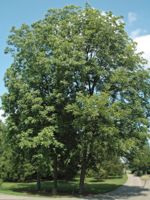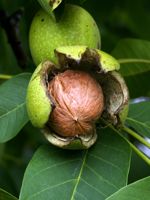Mon-Fri 9am - 5pm Mountain time
Hardy Pecan vs Carpathian English Walnut
Carya illinoinensis
Juglans regia Carpathian
NOT AVAILABLE THIS SEASON - MIGHT RETURN
NOT AVAILABLE THIS SEASON - MIGHT RETURN
Hardy Pecan trees are known for their edible nuts that ripen in late autumn. They can be eaten raw or cooked and can be used in a wide range of baked goods. If stored properly in a cool, dry location, they can be kept for up to 6 months in their shell. Trees tend to bear nuts at maturity, which occurs around 6 -10 years. The size and form of this tree also makes it a great shade or feature tree for your landscape.
For nut production, it is recommended that at least 2-3 are planted so that cross pollination can occur. In colder areas it is likely that nut production will be limited, especially in locations with late frosts and shorter growing seasons.
If exposed to high winds, Hardy Pecan is known to lose branches, but these can be used as firewood, or to smoke foods with a hickory flavour. Finding seed or seedlings of this tree is rare in Canada.
Note: plant this tree once. It will not respond well to transplanting.
Carpathian English Walnut is a great shade tree or a fantastic addition to a food garden. The taste is described as having a full flavour with a hint of sweetness and butterscotch. They are great for fresh eating, cooking, and baking. Thin shelled nuts split right down the center, making them easy to crack. Harvest ranges from late September to early October.
It is known for being highly productive and more cold hardy than other English Walnut varieties.
Carpathian English Walnut is considered to be self pollinating but planting with a second variety will result in greater yields. It can be cross pollinated with Black Walnut and others.

